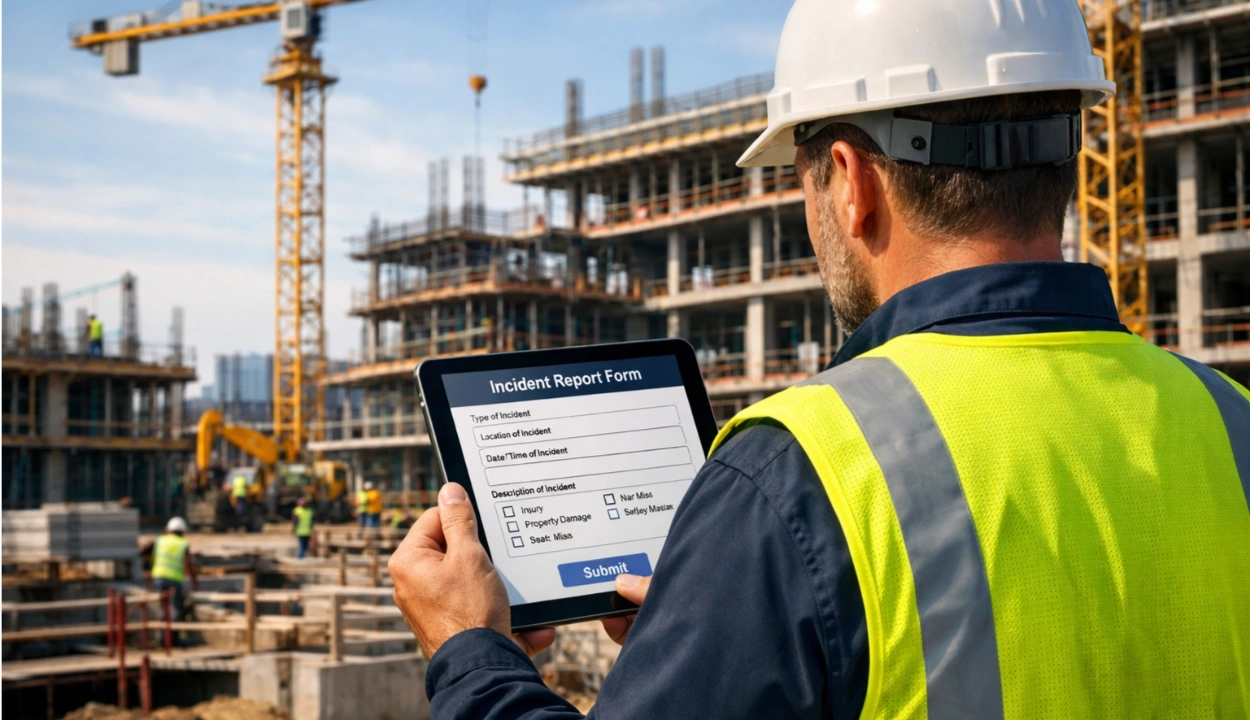Top 10 construction toolbox talk software in 2026
In construction, toolbox talks are one of the fastest ways to prevent incidents because they happen where the risk is: right before the work starts. Many contractors run daily toolbox talks on active sites because short, consistent pre-task conversations reduce surprises and reinforce the controls that prevent incidents.
But as projects scale across crews, shifts, and job sites, paper sign-in sheets and spreadsheets break down. That’s where construction toolbox talk software comes in: it helps you schedule talks, standardize topics, capture digital sign-offs, and keep audit-ready records without slowing down the field.
Below are the top 10 construction toolbox talk software options for 2026, including dedicated safety platforms and construction management tools that support toolbox talks through forms, meetings, and mobile workflows.
What is Construction Toolbox Talk Software?
Construction toolbox talk software is a digital platform designed to help construction companies manage and streamline their safety discussions, ensuring that all workers are informed, engaged, and compliant. The software automates critical aspects of safety talks, such as scheduling, tracking attendance, and documenting discussions. This makes it easier for construction managers to stay on top of safety compliance while ensuring that all team members are consistently educated on potential hazards.
Key features typically include:
- Automated scheduling to ensure that talks happen regularly.
- Customizable templates for various safety topics.
- Real-time tracking of participation and engagement.
- Centralized record-keeping for audit purposes.
By utilizing this software, construction teams can improve their safety management processes, reduce administrative work, and make safety discussions more accessible to everyone on-site.
How Often Should Toolbox Talks Be Carried Out?
There’s no single rule for every contractor, but most teams choose one of these patterns:
- Daily talks: Ideal for high-risk environments, large crews, or fast-changing conditions.
- Weekly talks: Works well for smaller teams or stable scopes, especially when paired with pre-task briefs.
- Pre-task talks: Best for high-risk work (excavation, lifting, lockout/tagout, confined spaces), or when conditions change.
Software makes this manageable by automating schedules and building a consistent record of what was covered, when, and by whom.
Quick Comparison: Top Features of Leading Toolbox Talk Software
Top 10 construction toolbox talk software
1. Clue
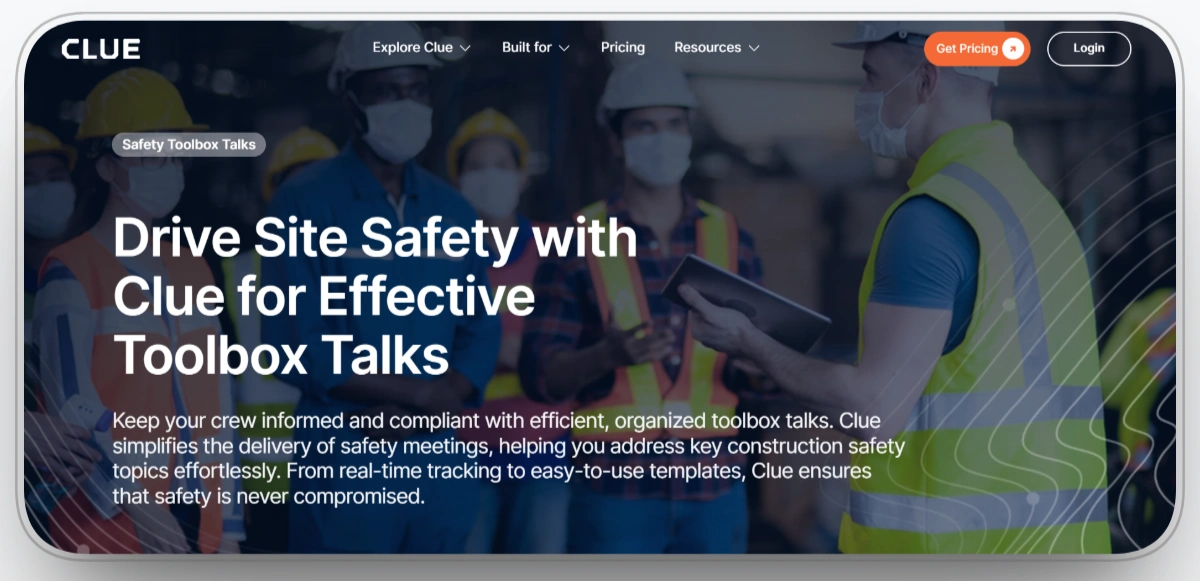
Ideal for: Equipment-led teams that want toolbox talks tied to inspections, work orders, maintenance activity, and jobsite risk.
Clue helps construction teams run toolbox talks without chasing paper sign-ins. Supervisors can schedule and dispatch talks to the field, use consistent templates, and capture attendance so every talk becomes a searchable, audit-ready record.
Where Clue stands out is how it ties safety conversations to the reality of equipment-led operations. When your fleet data, inspections, and maintenance schedules live in the same ecosystem, it’s easier to run talks that actually match what crews are doing today, heavy equipment movement, spotter protocols, lockout/tagout during maintenance, and jobsite traffic plans.
Key Features of Clue:
- Automated Scheduling
Clue makes it easy to schedule toolbox talks by automating reminders and dispatching them directly to the team, ensuring safety meetings are never missed. From a single platform, supervisors can manage all safety-related discussions, adjust schedules as conditions change, and track completed talks without juggling paperwork. This keeps communication consistent across crews and job sites while ensuring teams are prepared before work begins, reducing gaps that lead to safety risks.
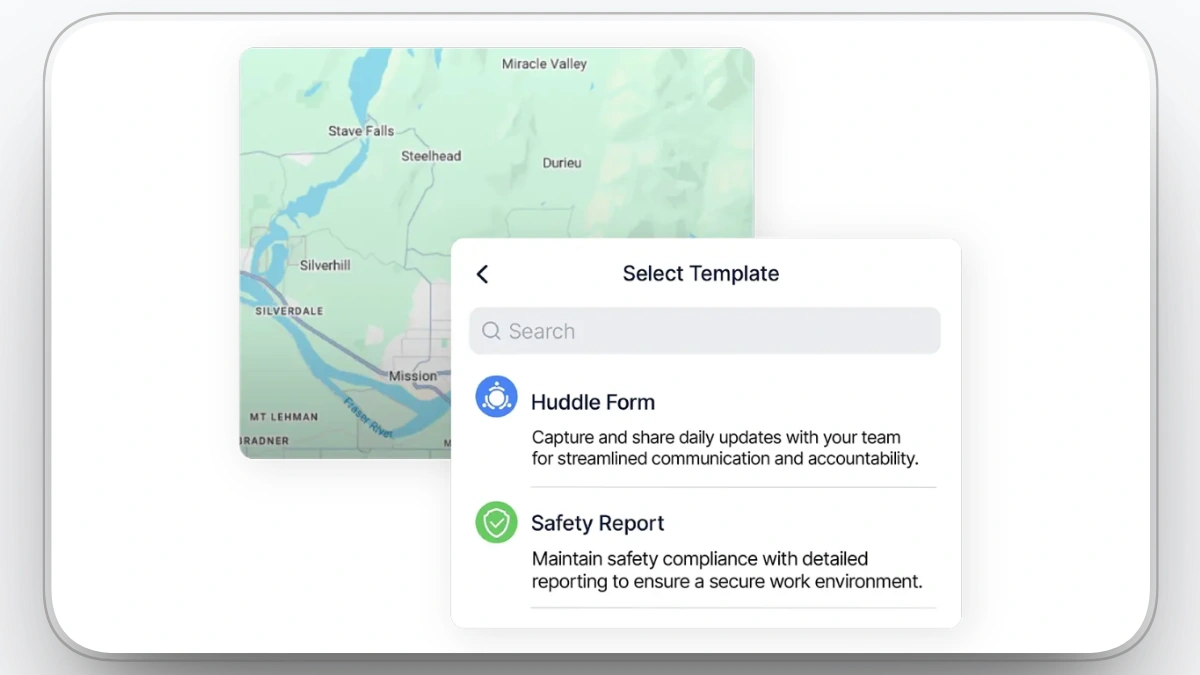
- Real-Time Tracking
With Clue, managers have real-time tracking of attendance and participation during toolbox talks, making it easy to confirm who attended, who signed off, and who still needs follow-up. This live visibility allows supervisors to address missed or incomplete participation immediately, strengthening compliance and ensuring safety discussions actually reach every crew member. - Centralized Record Keeping
All toolbox talk discussions are stored in one centralized location within Clue, making it easier to access past records, track compliance, and prepare for audits. This feature reduces administrative workload and ensures all safety discussions are documented for future reference.
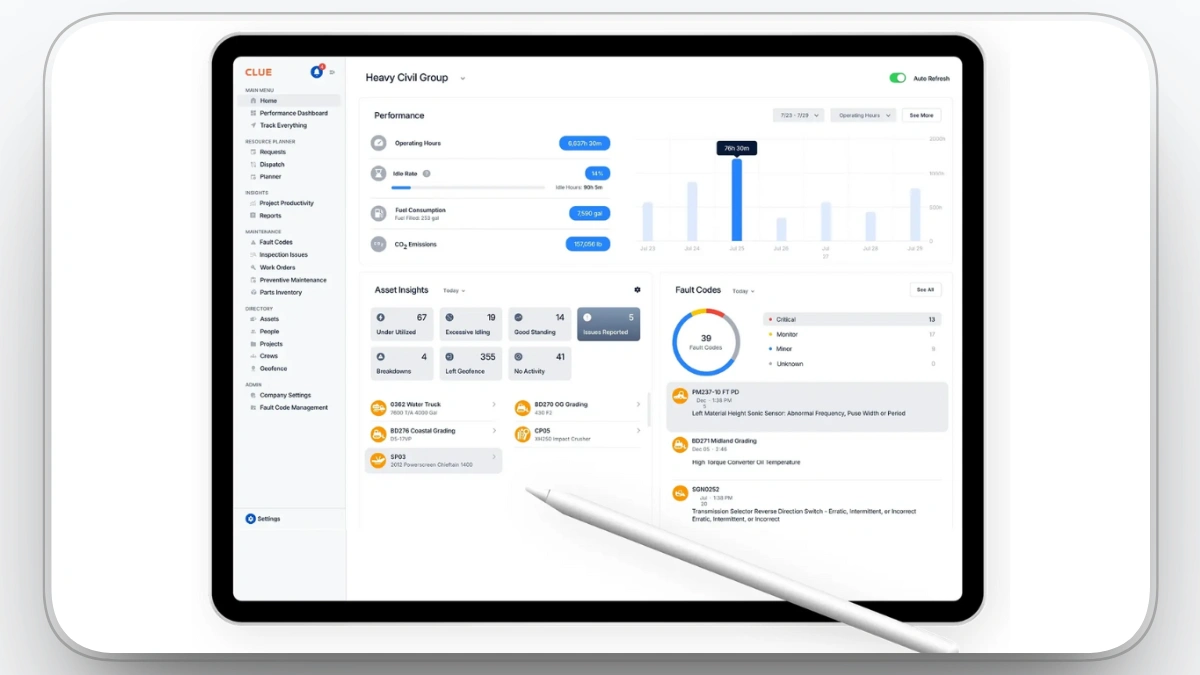
- Seamless Integration
Clue integrates effortlessly with other construction management tools like work orders and preventive maintenance schedules, allowing Clue integration to keep toolbox talks aligned with day-to-day project activities. By connecting safety discussions directly with operational workflows, this integration ensures safety measures stay in sync with ongoing operations rather than living in a separate system. - Mobile Accessibility
Access toolbox talk schedules, track attendance, and review safety information from anywhere with Clue’s mobile app. This feature enables construction teams in the field to stay updated on safety protocols, ensuring real-time communication and compliance no matter where they are.
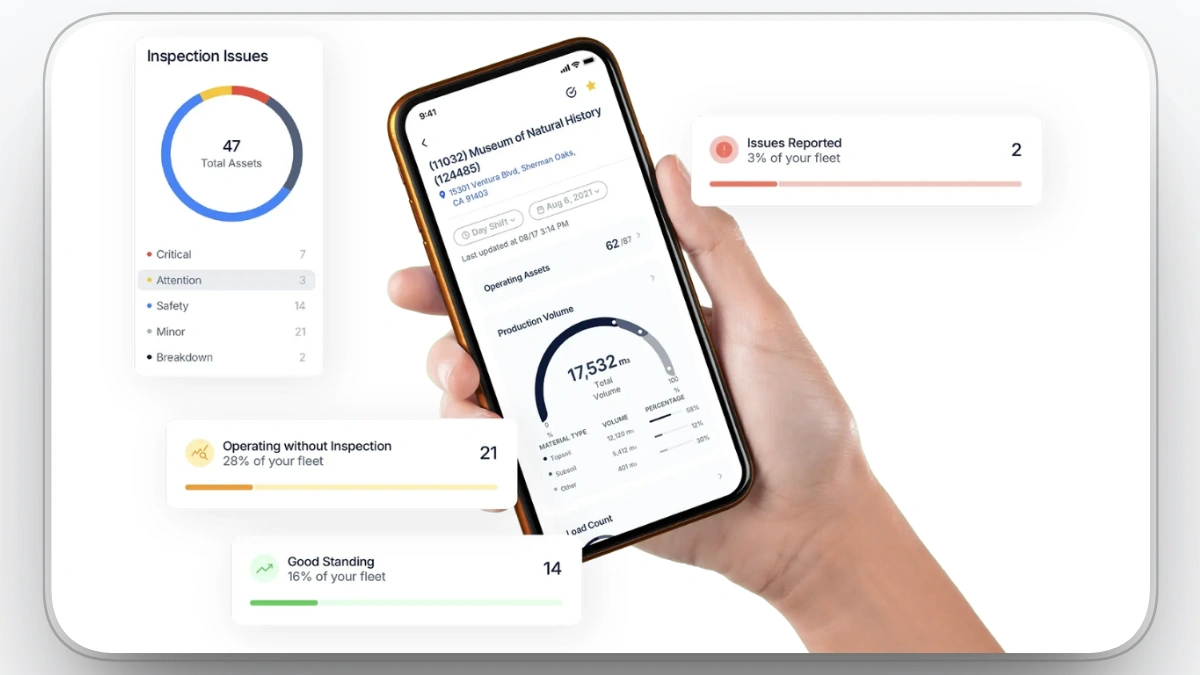
Clue Pros
- Automates toolbox talk scheduling, ensuring consistency across projects.
- Tracks team participation in real-time, ensuring full engagement.
- Centralizes all safety records, streamlining audits and compliance checks.
- Mobile-friendly, allowing easy access to safety talks and updates on-site.
Clue Con
- Requires a stable internet connection for real-time updates and tracking.
Clue Overall Rating
Capterra: 4.6/5
G2: 4.5/5
Clue User Reviews
Pricing
Explore Clue's pricing options.
2. SafetyCulture (iAuditor)
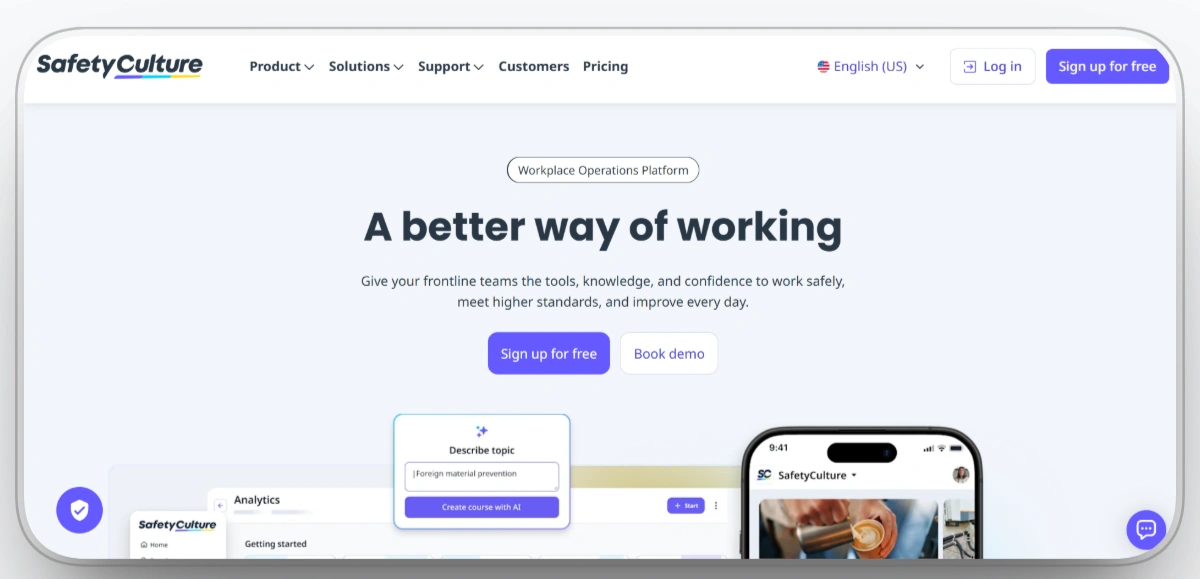
Best for: Inspections, risk assessments, and digital toolbox talk templates.
SafetyCulture (iAuditor) is a leading digital tool for construction teams focused on improving safety management and compliance. It specializes in providing toolbox talk templates that can be customized to meet site-specific needs, helping supervisors manage safety discussions with ease. The platform also offers powerful analytics to track safety trends and compliance metrics, making it easy to identify areas needing improvement.
By using SafetyCulture, teams can ensure that safety talks are based on real-time inspection data, allowing supervisors to immediately address potential risks. The software’s easy-to-use mobile interface ensures field teams can stay connected to safety protocols and complete tasks without paper documentation, reducing errors and increasing overall compliance.
Pros:
- Customizable toolbox talk templates.
- Mobile app for on-site access.
- Real-time analytics for safety data.
- Streamlines safety audits and inspections.
Cons:
- Limited for larger, more complex projects.
- The learning curve for advanced features.
- May require an additional cost for premium features.
- Does not integrate with some large-scale construction management systems.
SafetyCulture Overall Rating
Capterra: 4.6/5
G2: 4.6/5
SafetyCulture User Reviews
Pricing
Contact SafetyCulture for a personalized quote
3. Procore
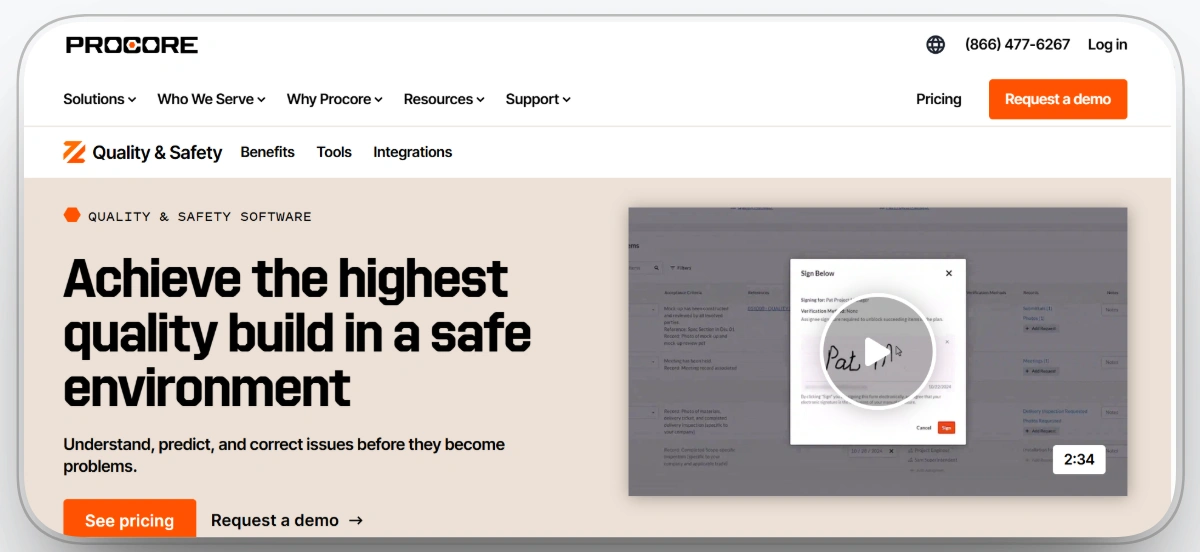
Best for: Comprehensive construction management with safety and communication tools.
Procore is a widely used construction management platform known for its robust safety management tools. It combines toolbox talk scheduling, incident tracking, and safety protocol documentation in one platform. Its comprehensive feature set ensures that safety discussions are easily tracked and documented for all stakeholders, helping maintain compliance with industry regulations.
The platform allows construction managers to integrate toolbox talks into the overall project workflow. By linking safety meetings to work schedules and progress reports, Procore provides a streamlined approach to keeping safety at the forefront of operations. This cloud-based solution ensures that teams in the field and office can access the latest safety updates and documentation.
Pros:
- Integrates safety management with overall project workflows.
- Easy-to-use interface for team collaboration.
- Provides comprehensive reporting tools for compliance.
- Ensures seamless communication between field and office teams.
Cons:
- Can be overwhelming for small teams due to its extensive features.
- Expensive for small to mid-sized construction firms.
- Requires time to get fully accustomed to all features.
- Limited customizability in safety templates.
Procore Overall Rating
Capterra: 4.5/5
G2: 4.6/5
Procore User Reviews
Pricing
Contact Procore for a personalized quote
4. Fieldwire (by Hilti)
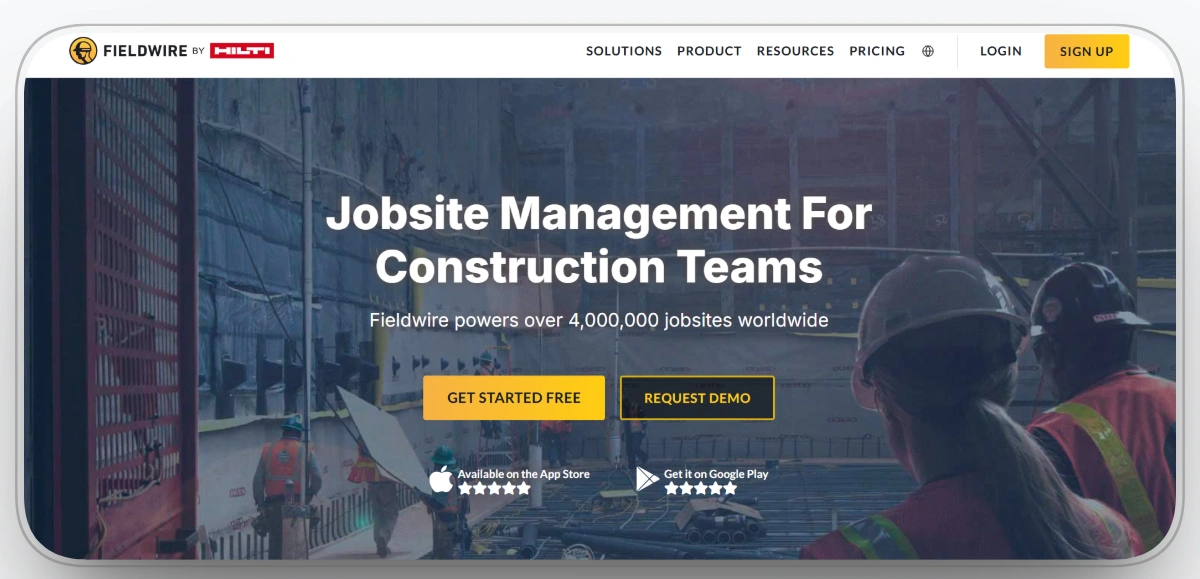
Best for: Field collaboration, task management, and safety communication.
Fieldwire excels in real-time field collaboration and task management, making it a great choice for construction teams focused on safety communication and toolbox talks. The software integrates safety tasks into project schedules, ensuring that safety issues are addressed during daily check-ins and updates. It provides a centralized hub for safety talks, allowing team members to easily access safety documents, reports, and any updates related to toolbox talks.
With Fieldwire, safety meetings are streamlined, allowing managers to track attendance and monitor the completion of safety tasks directly from the field. The software’s mobile app allows field workers to sign off on safety meetings and track compliance in real-time, making it an excellent tool for managing day-to-day safety operations.
Pros:
- Great for task management and team communication.
- Provides real-time updates on safety tasks.
- Easy integration with construction scheduling.
- Mobile app for on-site safety access and updates.
Cons:
- Limited customization options for safety reports.
- Can be cumbersome for teams unfamiliar with mobile software.
- Pricing may not be suitable for smaller firms.
- Advanced features may require additional training.
Fieldwire Overall Rating
Capterra: 4.6/5
G2: 4.5/5
Fieldwire User Reviews
Pricing
Contact Fieldwire for a personalized quote
5. Raken
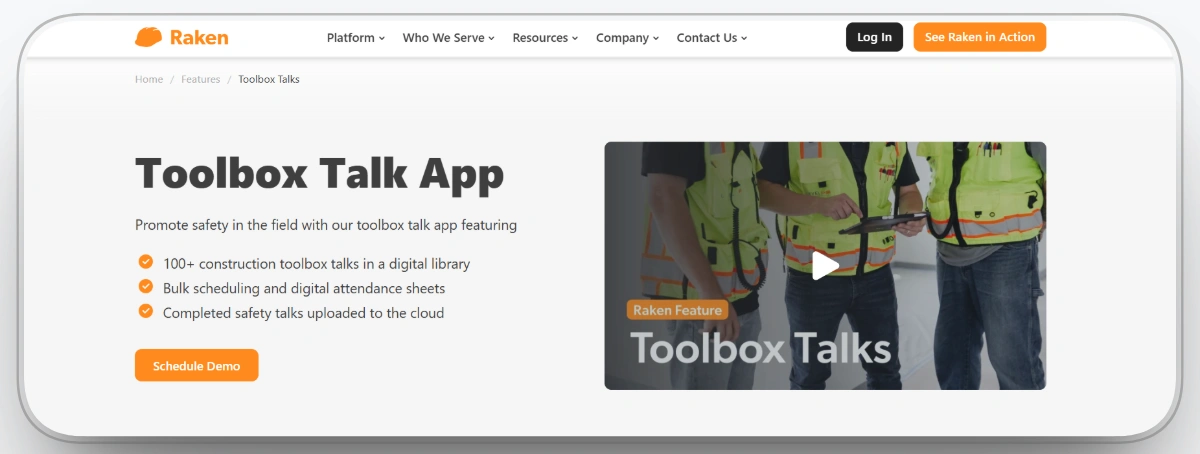
Best for: Vast library of toolbox talk topics and digital safety reporting.
Raken is a powerful toolbox talk software that simplifies safety management by offering a vast library of customizable safety topics. With Raken, construction teams can easily find and assign toolbox talk subjects based on real-time worksite needs. Its digital safety reporting capabilities help managers document meetings, track attendance, and measure safety performance across all projects.
The software's cloud-based platform allows for instant updates, ensuring all team members are on the same page regarding safety protocols. It also integrates with project management tools, allowing for smooth coordination between safety management and other project activities, which is essential for large-scale construction projects.
Pros:
- Extensive library of pre-built toolbox talk topics.
- Easy-to-use digital reporting tools for safety compliance.
- Streamlined attendance tracking and follow-up features.
- Excellent for large projects requiring centralized safety management.
Cons:
- May not be as customizable as other platforms.
- Some advanced features are only available on higher pricing tiers.
- Requires an internet connection for real-time updates.
- Can be complex for teams new to digital safety management tools.
Raken Overall Rating
Capterra: 4.6/5
G2: 4.6/5
Raken User Reviews
Pricing
Contact Raken for a personalized quote
6. Connecteam

Best for: Workforce management, digital checklists, and field team communication.
Connecteam is designed to help construction teams manage their workforce and improve safety communication through digital checklists and toolbox talk management. It offers a comprehensive mobile app that connects workers, allowing them to stay updated on safety protocols in real-time. By incorporating safety checklists and tools for real-time feedback, Connecteam ensures that safety is always top-of-mind, even for remote teams.
With Connecteam, managers can schedule safety talks and track team compliance effortlessly. The platform’s flexibility allows for customization of safety forms, enabling teams to tailor their toolbox talks to specific needs and environments. The user-friendly interface makes it easy for all team members to stay connected and informed.
Pros:
- Offers customizable safety forms and checklists.
- Mobile app for easy access to toolbox talks on-site.
- Real-time communication between field teams and managers.
- Simple, intuitive interface that requires minimal training.
Cons:
- Lacks deep integration with other construction project management tools.
- Some features may be limited for larger teams.
- Pricing could be high for smaller firms with basic needs.
- May require additional customization for complex projects.
Connecteam Overall Rating
Capterra: 4.6/5
G2: 4.6/5
Connecteam User Reviews
Pricing
Contact Connecteam for a personalized quote
7. Workyard
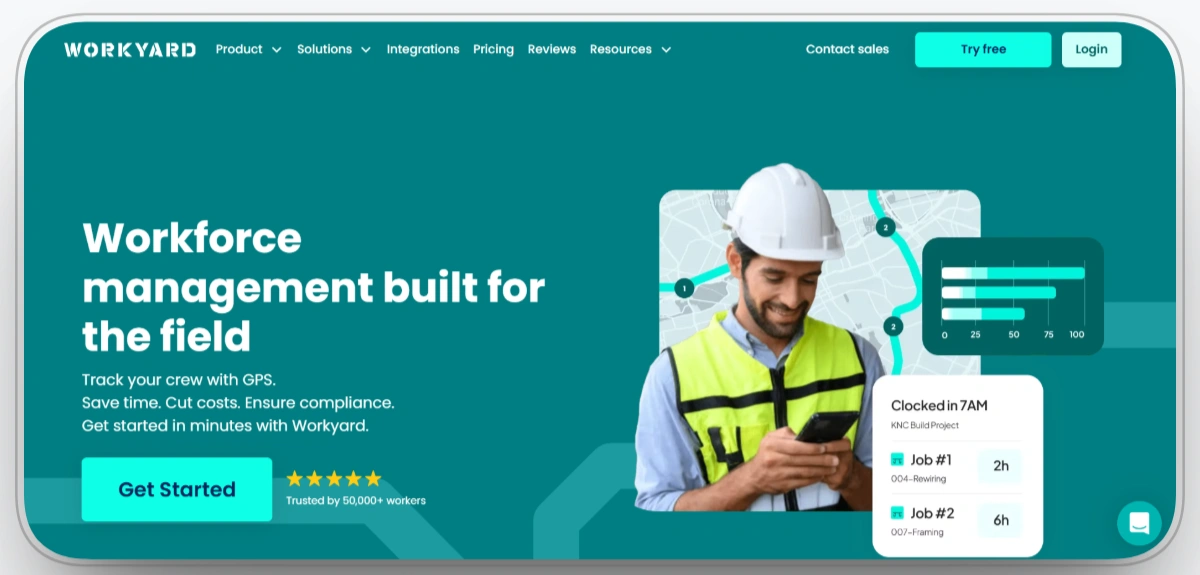
Best for: Workforce management, safety, and compliance with digital toolbox talks.
Workyard is an ideal solution for workforce management in the construction industry, providing essential features for digital toolbox talks and safety compliance. It streamlines safety meeting management by allowing construction teams to create, distribute, and track toolbox talks from any device. The platform’s digital checklists and compliance tracking tools ensure safety protocols are followed consistently, helping teams avoid potential risks.
With Workyard, project managers can track team attendance, engagement, and completion of safety tasks in real-time. The software allows teams to easily manage labor costs, track safety issues, and ensure every worker is aligned with the latest safety standards. It is perfect for teams that need a flexible and reliable tool to handle safety talks on job sites.
Pros:
- Digital toolbox talks with real-time tracking.
- Tracks safety compliance and labor costs.
- Customizable safety forms for specific job site needs.
- Mobile app for field teams to stay up-to-date.
Cons:
- Some advanced features are only available in higher-tier plans.
- Integration with other project management tools can be limited.
- Can be complex for smaller teams due to its many features.
- May not be as user-friendly for teams without tech experience.
Workyard Overall Rating
Capterra: 4.7/5
G2: 4.7/5
Workyard User Reviews
Pricing
Contact Workyard for a personalized quote
8. Safesite
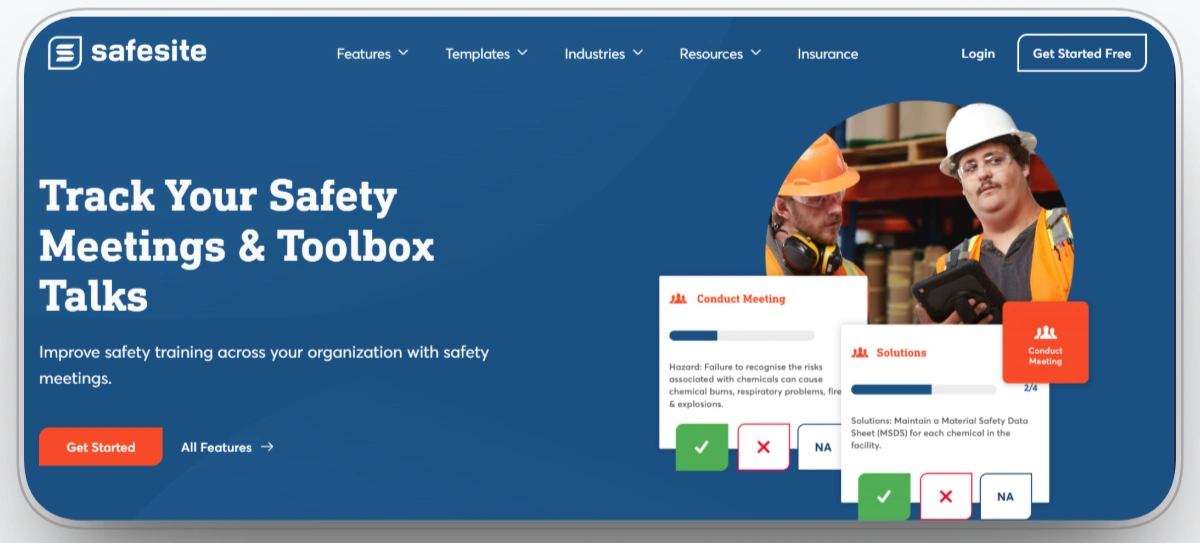
Best for: Construction safety, incident reporting, and toolbox talk management.
Safesite is a comprehensive construction safety software designed to streamline toolbox talks and incident reporting. The platform makes it easy to schedule, track, and document safety meetings, ensuring compliance with OSHA and other industry standards. Safesite’s tools help teams manage safety tasks, report incidents, and ensure workers are actively participating in safety discussions.
The software also offers a library of pre-built toolbox talk topics that can be customized to meet the unique needs of your job site. Its mobile-friendly design ensures that construction teams can access safety materials and report incidents directly from the field, which is essential for timely action and risk mitigation.
Pros:
- Pre-built library of customizable toolbox talk topics.
- Simplifies incident reporting and safety task management.
- Mobile app for easy on-site access to safety materials.
- Helps teams maintain compliance with industry standards.
Cons:
- Limited customizability of safety reporting templates.
- Higher pricing for smaller teams with basic needs.
- Some users report occasional syncing issues with the mobile app.
- Lacks certain integrations with larger construction management platforms.
Safesite Overall Rating
Capterra: 4.7/5
G2: 4.5/5
Safesite User Reviews
Pricing
Contact Safesite for a personalized quote
9. Autodesk Build
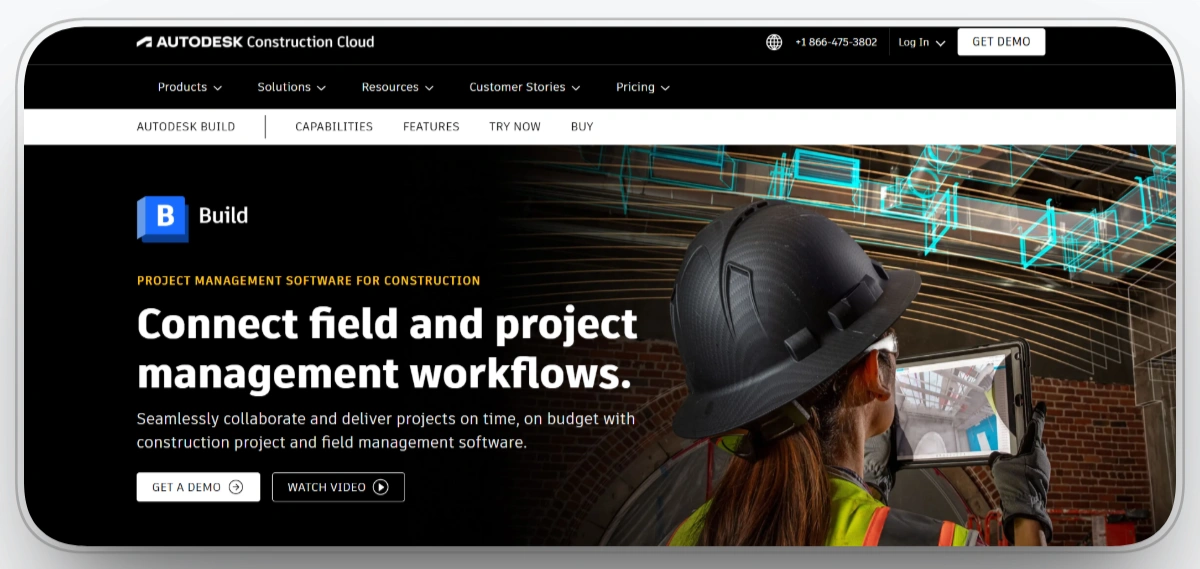
Best for: Integrated design-to-build workflows with safety management features.
Autodesk Build is part of the Autodesk Construction Cloud and is designed to integrate toolbox talk management directly into project workflows. The platform supports design-to-build workflows, ensuring that safety measures are embedded throughout the project lifecycle. It allows teams to manage safety discussions alongside design, planning, and execution, streamlining project management from start to finish.
By using Autodesk Build, project managers can schedule and track toolbox talks directly within the project management platform. The software enables teams to manage safety tasks and track their completion alongside project milestones, ensuring a seamless connection between safety and project progress.
Pros:
- Integrates safety management with design-to-build workflows.
- Tracks toolbox talk completion alongside project milestones.
- Helps maintain comprehensive project documentation for safety and compliance.
- Real-time access to safety updates and reports.
Cons:
- Pricing can be prohibitive for smaller projects or teams.
- Requires time to familiarize yourself with the broad range of features.
- May be overkill for teams only needing basic toolbox talk functionality.
- Some users report slow performance with larger projects.
Autodesk Build Overall Rating
Capterra: 4.7/5
G2: 4.4/5
Autodesk Build User Reviews
Pricing
Contact Autodesk Build for a personalized quote
10. eSUB Construction Software
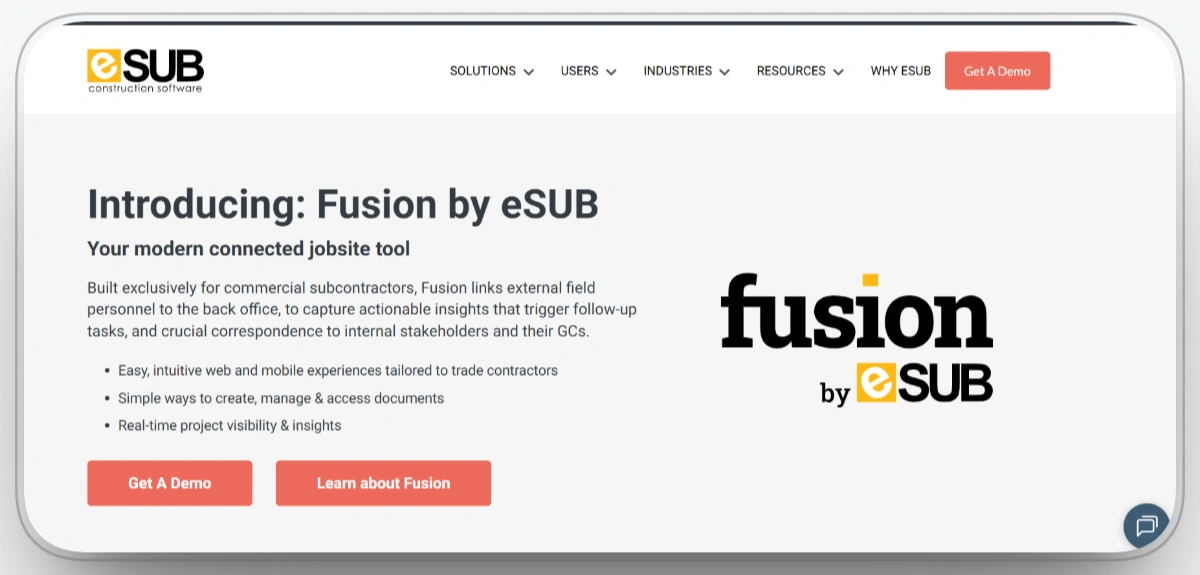
Best for: Field management and daily reporting for safety talks.
eSUB Construction Software offers robust field management tools that are ideal for managing and documenting toolbox talks. It provides digital safety reports that help construction teams stay organized and ensure that toolbox talks are consistently documented for compliance purposes. The software allows for easy scheduling, tracking, and reporting of safety meetings, making it an essential tool for teams working on high-risk construction projects.
With eSUB, construction teams can create digital toolbox talk forms, assign them to team members, and track their completion in real-time. The software integrates seamlessly with other construction management tools, allowing for better safety compliance tracking and reporting. Its cloud-based platform ensures that safety records are accessible anytime, anywhere, improving communication and ensuring compliance across projects.
Pros:
- Digital toolbox talk forms for easy scheduling and documentation.
- Integrates seamlessly with other construction management tools.
- Cloud-based platform for anytime, anywhere access.
- Excellent for managing safety compliance across multiple projects.
Cons:
- Some features are more suited to larger teams, making it less ideal for smaller construction companies.
- Pricing can be a barrier for smaller teams or those with limited budgets.
- Some users report issues with the user interface being a bit complex.
- Lacks some advanced customization options for safety reporting.
eSUB Construction Software Overall Rating
Capterra: 4.4/5
G2: 4/5
eSUB Construction Software User Reviews
Pricing
Contact eSUB Construction Software for a personalized quote
How to Track Safety Talks in the Construction Industry?
Tracking safety talks is a critical part of maintaining compliance and accountability. It ensures that safety discussions are documented properly and that workers participate consistently. Traditionally, this process was done manually, but construction toolbox talk software automates and simplifies it.
Here’s how you can track safety talks effectively using software:
- Automated Reminders and Scheduling: The software sends automatic reminders to team members, ensuring that safety talks are scheduled and not missed.
- Digital Attendance Tracking: With real-time attendance tracking, managers can quickly see who participated and follow up with anyone who missed a session.
- Centralized Documentation: All safety talk discussions and records are stored in one place, making it easy to access and review them for audits or compliance checks.
- Compliance Reporting: The software generates detailed reports, helping companies stay compliant with safety regulations and providing documentation for inspections.
Tracking safety talks digitally ensures a higher level of accountability, minimizes paperwork, and ensures that your team is always up-to-date on the latest safety protocols.
Choosing the Right Toolbox Talk Software for Your Business
To help you make an informed decision, here's a breakdown of which software is best suited for different safety management needs, based on features, team size, and specific project requirements.
- Choose Clue if: You need a comprehensive platform with real-time safety talk scheduling, custom templates, and maintenance management for optimizing safety and equipment usage.
- Choose SafetyCulture (iAuditor) if: You need a tool for inspections, risk assessments, and customizable toolbox talk templates with real-time data and mobile access.
- Choose Procore if: You need a robust project management tool that integrates safety talks, incident tracking, and real-time updates for large projects.
- Choose Fieldwire (by Hilti) if: You need a field collaboration platform with task management, real-time updates, and safety communication.
- Choose Raken if: You need a tool with a large library of toolbox talk topics and digital reporting for attendance tracking on big projects.
- Choose Connecteam if: You need a mobile-first platform for scheduling, communication, and real-time safety tracking for remote teams.
- Choose Workyard if: You need a flexible tool for workforce management, safety compliance, and real-time tracking on high-risk projects.
- Choose Safesite if: You need a platform for incident reporting, toolbox talks, and compliance tracking, with pre-built and customizable topics.
- Choose Autodesk Build if: You need BIM tools and project collaboration for safety discussions and planning in complex projects.
- Choose eSUB Construction Software if: You need a field management tool with daily reporting, toolbox talk forms, and safety compliance tracking.
Conclusion
Choosing the right toolbox talk software is essential for ensuring safety, compliance, and efficiency on construction sites. The best software doesn’t just schedule meetings; it integrates safety discussions into daily operations, providing real-time tracking, automated compliance monitoring, and actionable insights that drive continuous safety improvement.
Whether you're managing a large-scale project or a smaller team, there’s a toolbox talk software that fits your needs. Clue stands out as an all-in-one solution, integrating real-time safety tracking, customizable templates, and maintenance management to improve safety compliance and streamline operations. The right tool will enhance communication, keep your team engaged, and reduce risks, fostering a safety-first culture on your job site.
FAQs
1. What is a toolbox talk template?
A toolbox talk template is a pre-designed framework used to guide safety meetings on construction sites. These templates cover key safety topics and provide a structured format for discussing essential safety protocols. They help ensure consistency, compliance, and that all workers receive thorough and relevant safety information.
2. How can toolbox talk software help with compliance?
Toolbox talk software helps maintain compliance by automating scheduling, tracking attendance, and documenting safety talks digitally. This ensures that toolbox talks are conducted regularly and documented properly, making it easier for teams to meet industry safety regulations and maintain a robust safety record.
3. What industries can benefit from toolbox talk software?
While toolbox talks are most commonly associated with construction, toolbox talk software is valuable in various industries, including manufacturing, logistics, and oil & gas. It helps streamline safety talks, ensures compliance with industry regulations, and provides a simple way to document safety protocols, making it adaptable to any work environment.
Transform Your Equipment Management

.webp)






%20What%20It%20Is%20and%20What%20to%20Include.webp)
